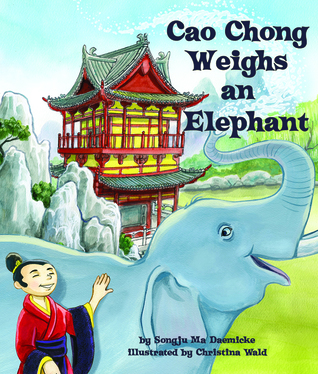WILD & WONDERFUL WEDNESDAY: Cao Chong Weighs an Elephant/Animal Tails/Night Creepers/Living Things and Nonliving Things
ABOUT THE BOOK
How much does an
elephant weigh? How do you know? How would you know if you didn’t have a
modern scale? Six-year-old Cao Chong, the most famous child prodigy in
Chinese history, faced just this problem! Chong watches as the prime
minister’s most trusted and learned advisors debate different methods.
The principle of buoyancy and a little bit of creative thinking help
this boy come up with a solution.
REVIEW
Based on true events, Cao Chong Weighs an Elephant, tells the story of six-year-old Cao Chong, who helped a group of Chinese governmental ministers figure out how to weigh an elephant without putting it on a scale. It's delightful to see a child outsmarting the adults. This is a fun book to use in STEM lessons on buoyancy and problem solving. The publisher provides additional information at the end of the book that would be perfect for using in such a lesson. This information includes a short biography of Cao Chong, a buoyancy experiment, and a geography activity. All these activities can be found on the publisher's website. The only thing missing is a works cited page with references.
ABOUT THE BOOK
Readers will be
fascinated by the many ways animals use their tails: to move on land,
swim, warn others, steer, hold on to things, keep warm, balance, fly,
attract a mate, and even to defend themselves! Apparently, tails are not
just for wagging when happy. Following Animal Eyes, Animal Mouths
(NSTA/CBC Outstanding Trade Science Award-winning book), and Animal
Legs, Mary Holland continues her photographic Animal Anatomy and
Adaptations series by exploring the many ways animals use their tails.
REVIEW
It's the gorgeous photographs that really make this book. Photographs of a fox, eagle, muskrat, opossum, and other animals highlight the variety of ways that animals use their tails. Each page, in addition to the photograph, gives a paragraph or two of information about the animal depicted and how it uses it's tail. This is a great book to use with units on animals and animal adaptations. The publisher has provided several activities that can be used with the book to encourage further exploration.
ABOUT THE BOOK
Short, lyrical text
makes this a perfect naptime or bedtime story. Young readers are
introduced to nocturnal animals and their behaviors. Older readers learn
more about each animal through paired-reading sidebar information.
REVIEW
This book combines simple text with longer more detailed text and lovely illustrations to present information about animals that are active at night. The shorter text would work well with younger listeners/readers while the longer text would satisfy readers interested in more information. This would also work well as a you read, I read text for children and adults. The illustrations do a nice job of highlighting some of the activities of certain nocturnal animals. As in all there titles, Arbordale has provided additional information and activities that can be accessed at the back of the book as well as on their website.
ABOUT THE BOOK
Using a wide variety of
stunning photographs, author Kevin Kurtz poses thought-provoking
questions to help readers determine if things are living or nonliving.
For example, if most (but not all) living things can move, can any
nonliving things move? As part of the Compare and Contrast series, this
is a unique look at determining whether something is living or
nonliving.
REVIEW
This book does a fabulous job of presenting the similarities and differences between living and nonliving things. Kurtz also points out the exceptions to the rules, demonstrating that categorizing things can be complicated. The combination of large, easy to read text and gorgeous photographs makes for a captivating read. The book also works really well as a STEM lesson with activities and ideas for lessons listed at the back of the book and available on the publisher's website.







Comments
Post a Comment